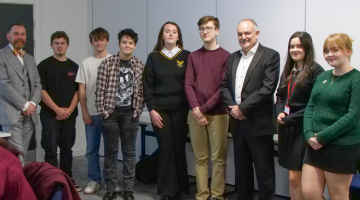2024/25 entry
BA (Hons) International Relations and Politics
Clearing
Want to study with LJMU this September? Visit our Clearing hub to apply now if you have your grades or register your interest and become a Clearing Insider to receive updates while you wait for your results. Your journey starts with Clearing.
Minimum UCAS points required: TBC
Why study International Relations and Politics at Liverpool John Moores University?
- Develop your own political voices and choose how to actively engage with world affairs
- Hear from experts and practitioners in the field of International Relations
- The option to study abroad for either a semester or a year with one of our overseas partners
- The option to do a year-long work placement in an international-related organisation
- Participate in field trips to visit and understand the complex workings of institutions and think tanks
- Join a highly motivated and research active academic community
- Attend the Perspectives in IR research seminar series
- Learn a language online through Rosetta Stone
About your course
This innovative degree will provide a grounding in international relations theory while examining in-depth issues of enduring international significance. In examining the challenges the world faces today, we will encourage you to develop your own opinions and actively engage in politics.
The degree takes an expanded definition of what is International Relations and covers a range of subjects from economics, politics, law and culture to examining the actions of international organisations, nation-states and non-state actors. It provides you with an essential grounding in international relations theory and a range of specialist modules, which examine in-depth issues of enduring international significance, such as conflict, state-building, and the role of multilateral organisations.
To develop your knowledge and interest in the varying topics and roles that people do, we will hold and attend regular events and workshops with practitioners and experts.
WATCH: a short video with programme leader, Dr Matthew Hill talking about the International Relations and Politics degree
Why study International Relationships and Politics at LJMU - YouTube
Fees and funding
There are many ways to fund study for home and international students
Fees
The fees quoted above cover registration, tuition, supervision, assessment and examinations as well as:
- Library membership with access to printed, multimedia and digital resources
- Access to programme-appropriate software
- Library and student IT support
- Free on-campus wifi via eduroam
Additional costs
Although not all of the following are compulsory/relevant, you should keep in mind the costs of:
- accommodation and living expenditure
- books (should you wish to have your own copies)
- printing, photocopying and stationery
- PC/laptop (should you prefer to purchase your own for independent study and online learning activities)
- mobile phone/tablet (to access online services)
- field trips (travel and activity costs)
- placements (travel expenses and living costs)
- student visas (international students only)
- study abroad opportunities (travel costs, accommodation, visas and immunisations)
- academic conferences (travel costs)
- professional-body membership
- graduation (gown hire etc)
Funding
There are many ways to fund study for home and international students. From loans to International Scholarships and subject-specific funding, you'll find all of the information you need on our specialist funding pages.
Employability
Typically, students who study the BA will be progressing from their A Levels in history and politics.
This programme aims to enhance your career prospects in a range of international relations related fields such as in the government and non-government sectors. It is why you will meet practitioners, go on field trips, and have the opportunity to gain work experience in the field.
If you are interested in studying international relations further then this BA will provide a solid basis for applying to do an MA in the subject.
Student Futures - Careers, Employability and Enterprise Service
A wide range of opportunities and support is available to you, within and beyond your course, to ensure our students experience a transformation in their career trajectory. Every undergraduate curriculum includes Future Focus during Level 4, an e-learning resource and workshop designed to help you to develop your talents, passion and purpose.
Every student has access to Careers Zone 24/7, LJMU's suite of online Apps, resources and jobs board via the LJMU Student Futures website. There are opportunities for flexible, paid and part-time work through Unitemps, LJMU's in-house recruitment service, and we also offer fully funded Discovery Internships.
One-to-one careers and employability advice is available via our campus-based Careers Zones and we offer a year-round programme of events, including themed careers and employability workshops, employer events and recruitment fairs. Our Start-Up Hub can help you to grow your enterprise skills and to research, plan and start your own business or become a freelancer.
A suite of learning experiences, services and opportunities is available to final year students to help ensure you leave with a great onward plan. You can access LJMU's Careers, Employability and Start-up Services after you graduate and return for one-to-one support for life.
Go abroad
LJMU aims to make international opportunities available to every student. You may be able to study abroad as part of your degree at one of our 100+ partner universities across the world. You could also complete a work placement or apply for one of our prestigious worldwide internship programmes. If you wanted to go abroad for a shorter amount of time, you could attend one of our 1-4 week long summer schools.
Our Go Citizen Scheme can help with costs towards volunteering, individual projects or unpaid placements anywhere in the world. With all of these opportunities at your feet, why wouldn’t you take up the chance to go abroad?
Find out more about the opportunities we have available via our Instagram @ljmuglobalopps or email us at: goabroad@ljmu.ac.uk.
A life-changing experience
There's so much more to university than just studying for a degree.
News and views
Browse through the latest stories and updates from the University and beyond
What you will study on this degree
Please see guidance below on core and option modules for further information on what you will study.
This course is currently undergoing its scheduled programme review, which may impact the advertised modules. Programme review is a standard part of the University’s approach to quality assurance and enhancement, enabling us to ensure that our courses remain up to date and maintain their high standard and relevancy.
Once the review is completed, this course website page will be updated to reflect any approved changes to the advertised course. These approved changes will also be communicated to those who apply for the course to ensure they wish to proceed with their application.
Further guidance on modules
Modules are designated core or optional in accordance with professional body requirements, as applicable, and LJMU’s Academic Framework Regulations. Whilst you are required to study core modules, optional modules provide you with an element of choice. Their availability may vary and will be subject to meeting minimum student numbers.
Where changes to modules are necessary these will be communicated as appropriate.
Level 4
Core modules
Introduction to International Relations and Politics
20 credits
This module enables you to understand the world in which we live today. It provides a solid grounding in the study of international affairs through the varying theories that have been developed throughout the 20th and 21st Centuries. Through discussing these theories, we also examine how they have informed the international system and the institutions and practices that operate within it.
Comparative Politics
20 credits
In order to understand how the state engages with other actors at the international level it is essential to understand how the state functions. It is driven both by theory and practical examples. In this module you will examine the various political models and how they operate in practice. How does China, for example, operate in the space between authoritarian rule and democracy? Does China's political model offer stability and an example for other states to follow? Can a state lose its democratic identity as well as gain one? These are all the kinds of questions that arise when comparing different political systems, states and societies with each other.
Level 5
Core modules
Debating International Relations Theories
20 credits
In the first year of your degree you would have examined the different theories that are applied in International Relations, and how they were developed. Whilst you would have touched on how these theories formed and how they disputed each other, this module goes into the controversies in further detail. Structured around the 'Great Debates', this module provides greater insight into the theories that help inform our understanding of the world.
Politics in Practice
20 credits
This module provides you with the opportunity to develop an in-depth understanding of a particular topic related to International Relations and Politics, and enables you to develop the necessary research skills for the work place and prepares you for your Level 6 research project module.
Optional Modules
Politics and Popular Culture
20 credits
This module enables you to explore politics and popular culture as a sub-field that articulates the ways in which politics is understood through popular culture. It demonstrates how theory as a means of making sense of the world impacts upon the everyday. It provides you with an opportunity to take ownership over your learning process through student-led seminars, guided by preceding interactive lectures.
The Scandinavian Dream: Nordic Politics, Culture, and Society
20 credits
This module deepens students' understanding of Scandinavian history, society, and politics. They engage in key debates, study various political systems, and explore Nordic culture through media and literature. The syllabus covers topics like the Welfare Model, colonialism, modernization, and contemporary political issues, offering a well-rounded perspective on the region's past and present.
Teaching International Relations and Politics
20 credits
Numbers on this module are strictly capped at 5 per institution. Alongside selecting this module in OMS, students wishing to follow this course will also have to make a direct application for consideration to the host institution. That application will take the form of a letter/personal statement outlining their suitability for this role and their commitment to teaching as a profession. This will take place in May/June. Initial shortlisting will be undertaken by the LJMU IRP team taking account of the following criteria: Record of attendance through Level-4 to be at least 75% across semester 2. Academic performance at Level-4: successful applicants will have achieved a minimum overall level mean mark of at least 60%. A clearly articulated appreciation of the nature of teaching and a commitment to this vocation. Where possible, evidence of teaching experience either as a classroom assistant, or equivalent, or teaching observation. All DBS checks will be completed with the host institution.
Terrorism, Race and Empire
20 credits
This module aims to bring together the critical study of terrorism and critical approaches to the study of race and empire. This module will critically examine contemporary counter-terrorism practices and their historical origins in colonial contexts. As such, this module will provide students with the necessary theoretical tools to understand how contemporary discourses on ‘terrorism’ open up wider questions of power, coloniality and empire. Students will further be provided with the tools to apply decolonial approaches to contemporary issues in world politics. In particular, this module will be important for students who are keen on pursuing a career within research, policy-making, NGO work, and organisations concerned with security, development and peace-building, counter-terrorism, and counter-insurgency, as well as race, gender, and decoloniality.
Level 6
Core modules
Research Project in International Relations and Politics route 1
40 credits
The dissertation is an independent research project. Working under the direct supervision of a research-active member of staff, you will produce an extended piece of original independent research which will draw upon the latest developments in your field and demonstrate your in-depth knowledge. It will further enhance key transferable skills developed from Level 5 such as project management, effective research skills, effective communication, critical analysis and high-level evaluation of data, as well as professional time-management.
Research Project in International Relations and Politics route 2
40 credits
The module is based on the Hacking for Defense™ (H4D) programme initially developed at Stanford University (http://hacking4defense.stanford.edu) and is an education initiative sponsored by the U.S. Defense Accelerator, and National Security Innovation Network (NSIN). In the UK, Hacking for Ministry of Defence (H4MoD) is funded by the Ministry of Defence.
Optional Modules
Challenging Western-centrism in International Relations
20 credits
This module is designed with the understanding that our extant historical knowledge (which is implicitly Eurocentric) needs to be globalised. It means the non-western world should be better weighted and given due attention rather than seen as a passive receiver of western impacts. It emphasises a lot on the historically situated forces in the making of non-western world of ideas and, more importantly, their connections and complex relationships.
US Democracy Promotion in the Contemporary Era
20 credits
This module provides you with a critical reflection on the application of democracy promotion by successive US governments, and questions whether democracy promotion as employed by the US delivers democracy.
World Literature: Writing from the Periphery
20 credits
This module will introduce the concept of 'world literature' through a selection of texts from the twentieth to the twenty-first centuries in relation to the rise and expansion of a global modernity. You will examine on-going critical debates around key areas of research in the global humanities: a singular modernity, the politics of translation, the periphery and the world system.
International Law, Peace and Security
20 credits
This module provides you with an understanding of the history, nature and operation of international law and the actors and bodies involved in the development and enforcement of international law. It encourages reasoned, critical analysis and debate of contemporary issues within international law, with particular reference to the role of the United Nations in the maintenance of international peace and security.
Teaching and work-related learning
Excellent facilities and learning resources
We adopt an active blended learning approach, meaning you will experience a combination of face-to-face and online learning during your time at LJMU. This enables you to experience a rich and diverse learning experience and engage fully with your studies. Our approach ensures that you can easily access support from your personal tutor, either by meeting them on-campus or via a video call to suit your needs.
The aim is to give you as much insight into the world of international relations as possible and this is best achieved through a mix of academic discussion and real-world experiences.
Work-related Learning
This degree is focused on helping you to develop first-rate skills in communication and critical analysis, which are highly valued by employers.
Support and guidance
Dedicated personal tutor, plus study skills support
From the moment you begin your studies at LJMU, you will be allocated a personal tutor who will meet with you one-to-one to discuss course-related issues, monitor your progress and help you to put your career plans in place.
Assessment
Assessment varies depending on the modules you choose, but will usually include a combination of exams and coursework.
Teaching is a combination of class discussions, lectures and workshops with core academic staff and invited practitioners, experts and guest lecturers. The aim is to give you as much insight into the world of international relations as possible and this is best achieved through a mix of academic discussion and real-world experiences.
The aim in all the assessments is to test your understanding of international relations and politics. We all learn in different ways, and our assessments are a mixture of essays, essay plans, presentations and research project.
Course tutors
Our staff are committed to the highest standards of teaching and learning
Dr Matthew Hill
Programme leader
Matthew joined Liverpool John Moores University as a Senior Lecturer in US History and International Relations in April 2014. Prior to LJMU, Matthew was a Senior Lecturer at Anglia Ruskin University working as the Course Convenor for the MA in International Relations. Prior to that, he worked as a Lecturer in US Politics at the School of Advanced Study, University of London where he taught on the MA in Understanding and Securing Human Rights at the Institute of Commonwealth Studies. He was also the principal investigator for two US-based research projects on UK-US Relations In An Age Of Global War 1939-1945, which examined official UK perspectives towards the US, and examined Women and US Foreign Policy, where he interviewed predominantly women involved, and affected by US foreign policy. Matthew was also a lecturer in politics at De Montfort University, Oxford Brookes University and Cardiff University. He completed his Ph.D. on US democracy promotion in Bosnia and Afghanistan under Presidents Clinton and Bush, and his MA was in Near and Middle Eastern Studies at the School of Oriental and African Studies.
This is an ideal course for people who wish to develop their own political voices and choose how to actively engage with world affairs.
Facilities
What you can expect from your School
The School of Humanities and Social Science offers an ideal environment in which to expand your knowledge and horizons. Situated on Mount Pleasant in the new ‘Knowledge Quarter ' of Liverpool, the School is home to five subject areas: English, History, International Relations, Sociology, and Media, Culture & Communication. It has a lively programme of cross-disciplinary research seminars, conferences, visits from international scholars and public events. Research from the School is recognised nationally and worldwide.
The university reserves the right to withdraw or make alterations to a course and facilities if necessary; this may be because such changes are deemed to be beneficial to students, are minor in nature and unlikely to impact negatively upon students or become necessary due to circumstances beyond the control of the university. Where this does happen, the university operates a policy of consultation, advice and support to all enrolled students affected by the proposed change to their course or module.
Further information on the terms and conditions of any offer made, our admissions policy and the complaints and appeals process.











